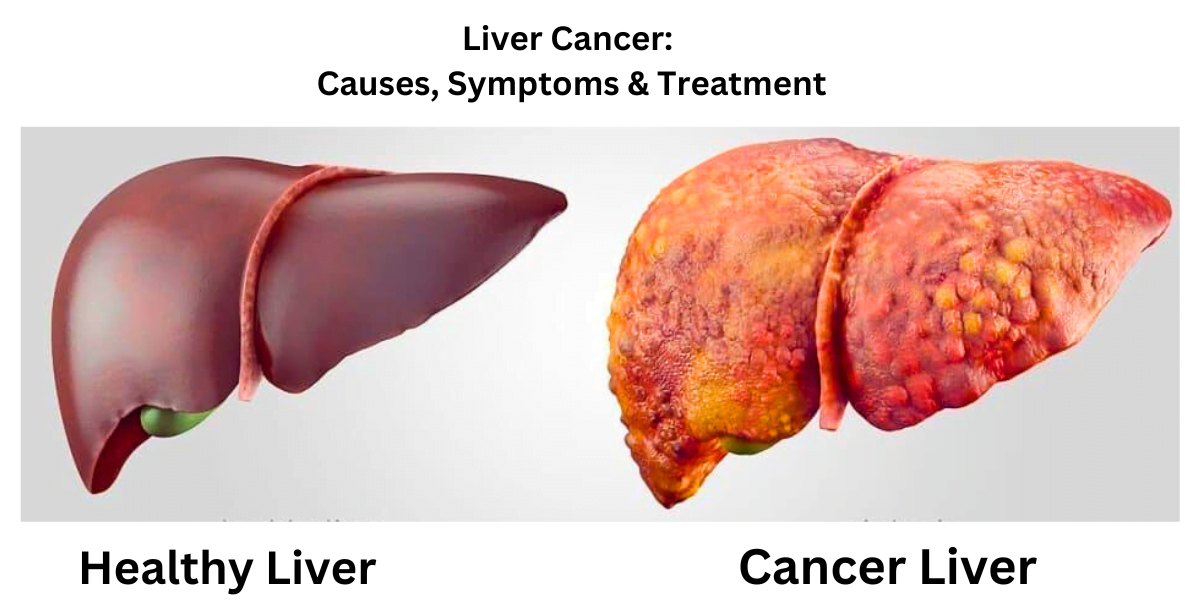BLOG
Liver Cancer: Causes, Symptoms and Treatment

Liver cancer is a serious and potentially life-threatening condition that affects thousands of individuals worldwide every year. As the liver plays a crucial role in filtering toxins, aiding digestion, and regulating metabolism, any impairment due to cancer can have severe consequences on health. This blog aims to explore the causes, symptoms, and various treatment options for liver cancer, with a focus on the best medicinal treatments currently available.
What Causes Liver Cancer?
Liver cancer can occur as a primary disease, where the cancer originates in the liver, or as a secondary or metastatic cancer, which spreads from another part of the body. The primary liver cancer, known as hepatocellular carcinoma (HCC), is the most common type. Several factors increase the risk of developing liver cancer:
- Chronic Viral Hepatitis: Hepatitis B and C are significant risk factors. These viruses can lead to long-term infection and eventually cause liver cancer.
- Cirrhosis: This condition involves progressive liver damage, leading to scarring and dysfunction. Cirrhosis can be caused by alcohol abuse, hepatitis infection, or fatty liver disease.
- Genetics: Family history of liver cancer increases risk.
- Other Factors: Chronic alcohol abuse, obesity, and exposure to aflatoxins (toxins produced by certain molds that can contaminate stored grains and nuts) also heighten the risk.
Symptoms of Liver Cancer
In its early stages, liver cancer often does not present any symptoms. As the disease progresses, symptoms may include:
- Weight loss without trying
- Loss of appetite
- Upper abdominal pain
- Nausea and vomiting
- General weakness and fatigue
- Liver enlargement (hepatomegaly) or swelling in the abdomen
- Jaundice (yellowing of the skin and eyes)
- White, chalky stools
Detecting liver cancer early is challenging due to the vague nature of the symptoms, which often resemble those of other less serious conditions.
Diagnosing Liver Cancer
Diagnosis of liver cancer involves a combination of clinical evaluation, imaging, and sometimes biopsy. Tools like ultrasound, computed tomography (CT), and magnetic resonance imaging (MRI) help visualize the liver and detect abnormalities. Blood tests, including liver function tests and alpha-fetoprotein (AFP) testing, are also commonly employed to assist diagnosis.
Treatment Options for Liver Cancer
Treatment for liver cancer depends on the stage of the disease, the patient's overall health, and specific characteristics of the cancer. Common treatments include:
- Surgery: When detected early, removing the tumor surgically can be an effective treatment. In cases where surgery is not viable, liver transplantation might be considered.
- Radiotherapy: This involves the use of high-energy rays to target and kill cancer cells. Techniques like stereotactic body radiotherapy (SBRT) are particularly effective for localized tumors.
- Chemotherapy: Uses drugs to kill cancer cells, but it is less effective in treating liver cancer compared to other cancers.
- Targeted Therapy: Drugs like sorafenib (Nexavar), which specifically target cancer cells, are now standard for treating advanced liver cancer. These drugs help block the growth and spread of cancer cells while minimizing damage to healthy cells.
- Immunotherapy: A newer form of treatment that helps the body's immune system recognize and destroy cancer cells. Drugs like nivolumab (Opdivo) have shown promising results in treating liver cancer.
Best Medicinal Treatments
Among the medicinal treatments, targeted therapy and immunotherapy are seen as the best approaches for advanced liver cancer. Sorafenib (Nexavar) has been a standard treatment, slowing cancer growth and potentially extending life expectancy. Nivolumab (Opdivo), as part of immunotherapy, has also been effective, particularly in cases where sorafenib is not suitable.
Managing Liver Cancer
Living with liver cancer involves regular monitoring and treatment adjustments. Besides medical treatments, patients are advised to:
- Maintain a healthy diet: Focus on a balanced diet rich in fruits, vegetables, and lean proteins.
- Avoid alcohol: Alcohol can exacerbate liver damage.
- Regular exercise: Helps maintain overall health and alleviates symptoms.
Conclusion
Liver cancer remains a challenging condition, but advancements in medical science have significantly improved the prospects of management and treatment. Early detection and the use of targeted therapies and immunotherapy have shown to enhance quality of life and survival rates. If you or someone you know is at risk or showing symptoms of liver cancer, prompt medical consultation and testing are critical for early intervention. Remember, every individual case is unique, so discussing treatment options thoroughly with a healthcare professional is crucial.More

